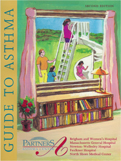Guide to Asthma
Asthma Management Practice Sessions: "What would you do if...?"
If you have asthma, it is possible — even likely — that at some time in your life you will find yourself having symptoms of an asthma attack. Cough, chest tightness, wheezing, and difficulty breathing may come on suddenly or gradually. You may have only one of these symptoms or all of them. The attack may be brought on by a respiratory tract infection or exposure to something to which you are allergic. It may be triggered by smoke, strong fumes, or a change in your medicines. Possibly you will not be able to identify any cause; your breathing just will become labored. On occasion, you will detect difficulty with your asthma based on the result that you get when using your peak flow meter even before you notice any change in your breathing.
Our goal, like yours, is that you never have an asthma attack — or, at most, very rarely. At the same time, we would like you to be prepared and know what to do to help yourself if an asthma attack develops. We encourage you to be prepared for what may be a rare event.
We think that the best approach is for you to consider in advance what you would do in the event of an attack of asthma. What would you do first for a mild or moderate attack? What would you do if you didn't quickly get better? What would you do if you were suffering a severe asthma attack? What if the initial treatment didn't work?
Having read through this Asthma Guide, especially Lesson #7 (What to do for an asthma attack: Your asthma Action Plan), you will have some ideas about actions that you can take in the event of an asthma attack. You also will want to discuss your asthma action plan with your physician, and perhaps share some of this information with family members and/or close friends.
In this section, we offer you the opportunity to practice your responses to an asthma attack. Some of these made-up case examples may mirror your own situation closely; others may not be relevant to your asthma or to the treatments that you have available to use at home. We hope that all of these Practice Sessions give you the opportunity to pretend that you are having to deal with worsening of your asthma.
As in real life, you will be asked to make some initial decisions. Part of that decision making is knowing when to seek help. Remember that managing asthma attacks does not mean having to stay at home and care for your asthma yourself. Rather, it means two important things: First, knowing what initial steps you can take to get better, and second, knowing where and how to get help when you need it quickly.

